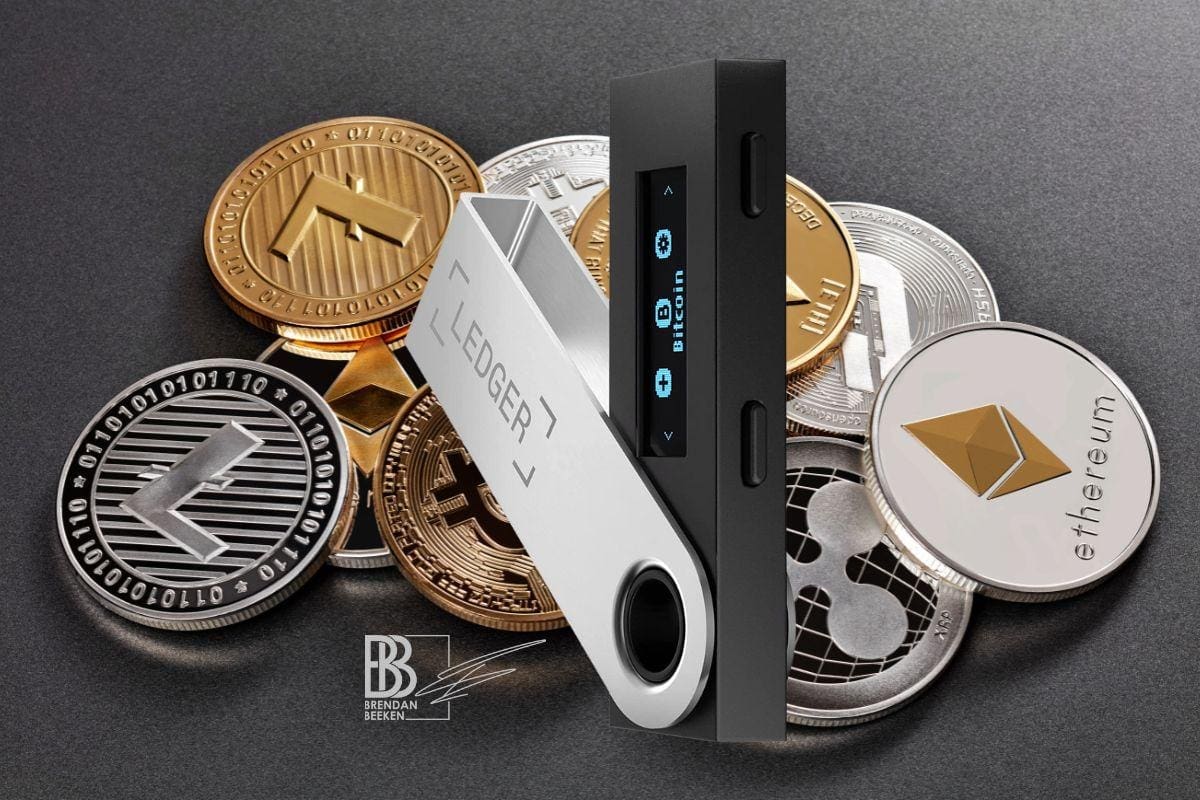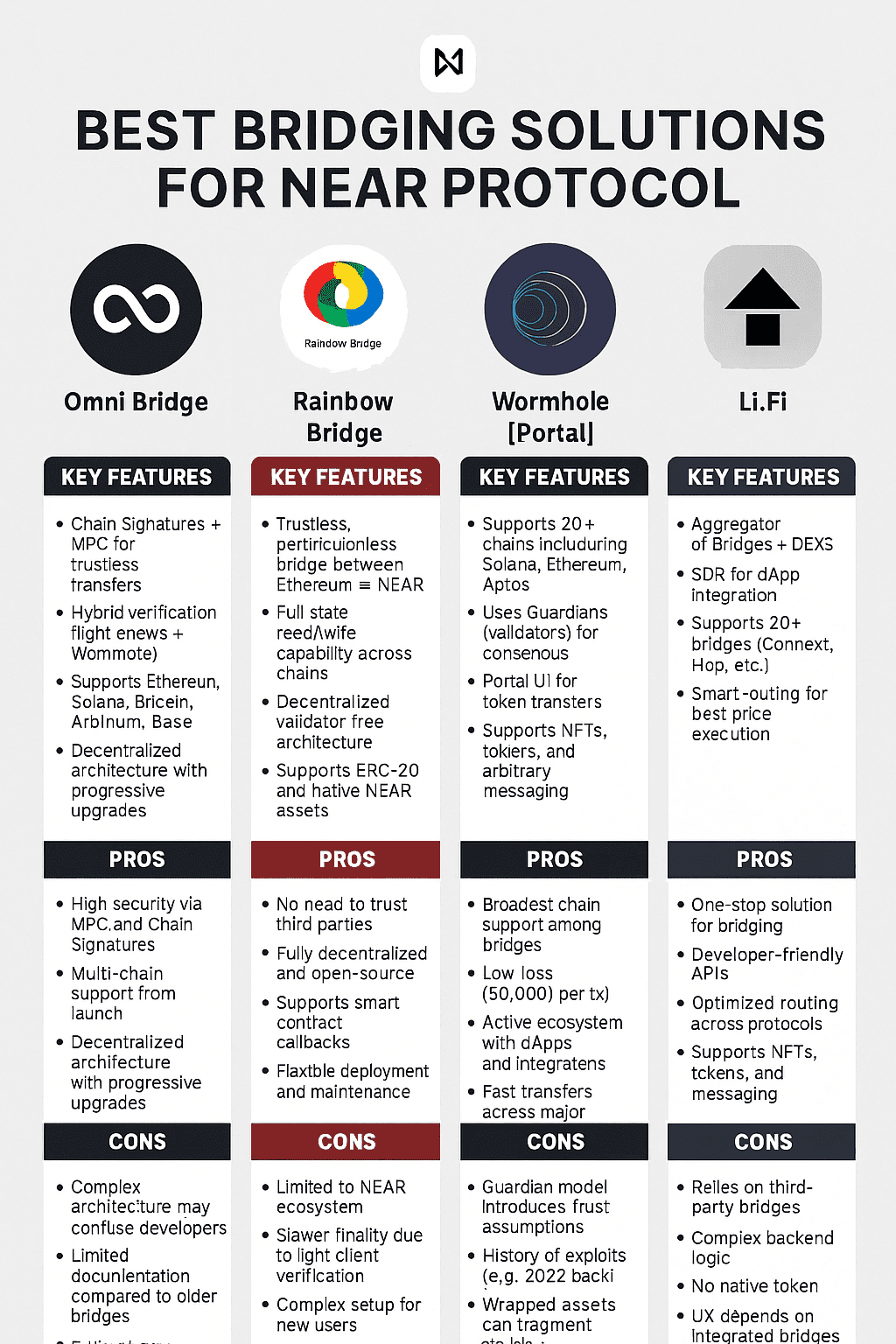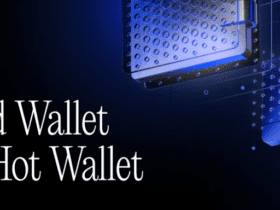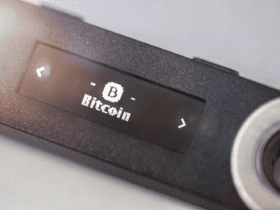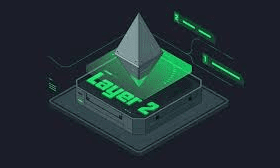In this article, I will talk about the Best Crypto Wallets for Beginners and their role in the secure storage, sending, and managing of cryptocurrencies and why it is crucial to choose the right wallet for your needs in terms of security and usability.
I will outline the most beginner friendly choices in 2025, whether you opt for a mobile application, desktop software, or a piece of hardware.
Key Points & Best Crypto Wallet For Beginners List
| Crypto Wallet | Key Points |
|---|---|
| MetaMask | User-friendly, supports Ethereum & ERC-20 tokens, browser & mobile app. |
| Trust Wallet | Mobile-focused, supports multiple blockchains, staking available. |
| Ledger Nano X | Hardware wallet, highly secure, Bluetooth-enabled, supports 1800+ coins. |
| Trezor Model T | Hardware wallet, strong security, easy-to-use interface. |
| Coinbase Wallet | Beginner-friendly, integrates with Coinbase exchange, mobile app available. |
| Exodus Wallet | Desktop & mobile wallet, intuitive UI, supports 200+ cryptocurrencies. |
| Atomic Wallet | Multi-currency wallet, built-in exchange, staking options. |
| Electrum | Lightweight Bitcoin wallet, strong security, advanced features for enthusiasts. |
| Binance Wallet | Integrated with Binance exchange, supports multiple coins, staking available. |
| Guarda Wallet | Multi-platform, non-custodial, supports a wide range of tokens. |
10 Best Crypto Wallet For Beginners 2025
1. MetaMask
MetaMask is very simple crypto wallets for beginners is one of the very first wallets created in the crypto space. The wallet supports Ethereum and ERC-20 tokens and has a web extension and mobile app.
The app makes it simple to use dApps. New users to cryptocurrency enjoy the simple design and the step-by-step guide in the set up process, along with the wallet’s highly secured design for key and private information.
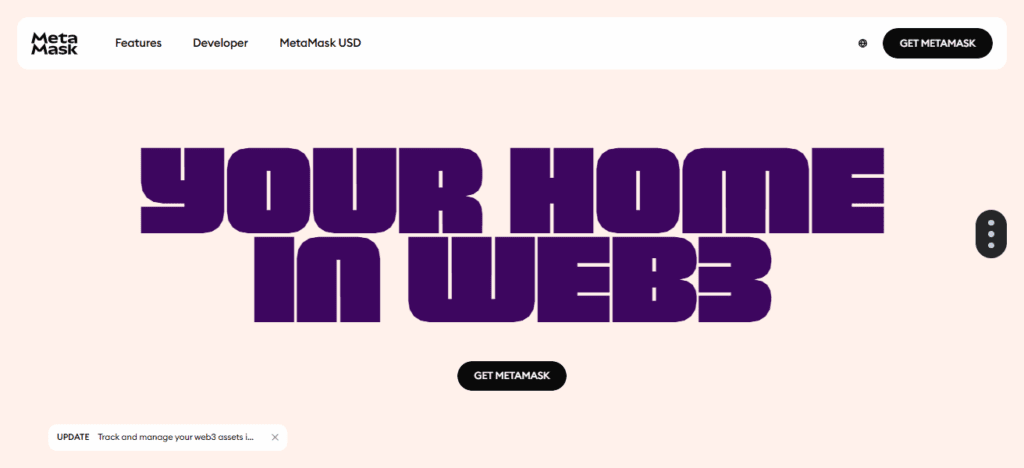
MetaMask supports hardware wallets for users with large amounts of cryptocurrency. The wallet supports DeFi and NFT, which makes it even more useful for beginners.
Pros And Cons MetaMask
Pros:
- Offers an easy and approachable step for first-time users.
- Works with Ethereum and ERC-20 tokens as well as dApps.
- Allows users to connect hardware wallets for extra security.
- Works with a mobile app as well as a browser extension.
Cons:
- Ethereum-based tokens are the only ones supported, due to minimal multi-chain.
- All users must be cautious, as phishing attempts targeting online wallets are prominent.
- Powerful wallets, unlike Gemini, are easy to lose.
- Ethereum network congestion greatly impacts transaction fees.
2. Trust Wallet
Trust Wallet is a mobile application and a non-custodial cryptocurrency wallet. It supports hundreds of cryptocurrencies along with many blockchains.
Trust Wallet is a favorite among beginners due to its sleek design and simplified interface. Trust Wallet is a non-custodial wallet meaning users have private key control and full asset protection.
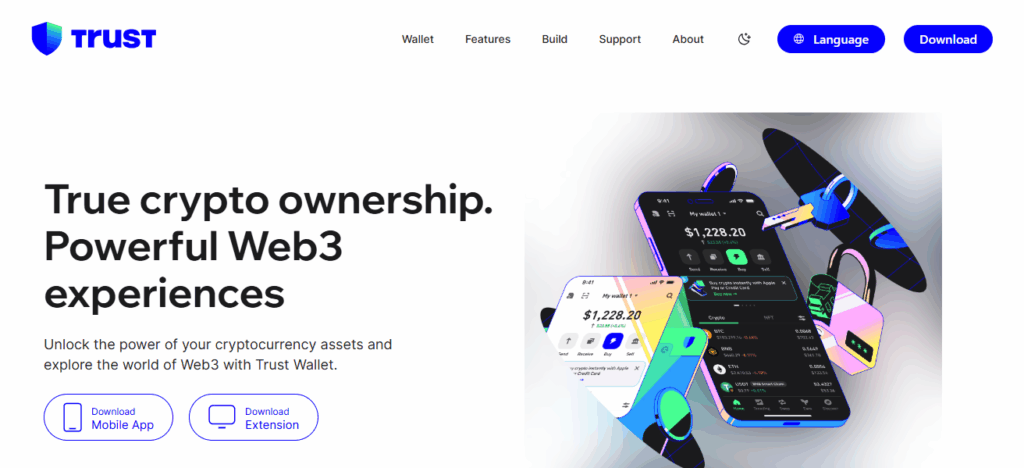
There is an included Web3 browser which allows for interaction with decentralized applications and NFT markets.
Trust Wallet’s integration with Binance Smart Chain and Ethereum-based tokens make it a flexible wallet. Trust Wallet’s and range of security protections makes it ideal for first time crypto investors.
Pros And Cons Trust Wallet
Pros:
- Multiple blockchains and hundreds of cryptocurrencies are supported.
- Wallet has a simplified mobile interface, user-friendly.
- Built-in staking capabilities to earn crypto rewards.
- Web3 browser is included for DeFi, and interaction with NFT.
Cons:
- Exclusively mobile design is off-putting for some users.
- Device is exposed to the most danger, lacking default security for the software.
- Ignored for not having plenty of advanced trading features.
- Common seed phrases are highly valuable and losing them makes it impossible to reclaim assets.
3. Ledger Nano X
The Ledger Nano X is a luxury hardware wallet that provides unparalleled security to crypto professionals and neophytes alike. Bluetooth connectivity and offline storage works hand in hand to ensure private keys are never vulnerable to online attacks.
The wallet can support 1,800+ cryptocurrencies such as Bitcoin, Ethereum, and leading altcoins. Its companion app, Ledger Live provides easy management, tracking, and even staking!
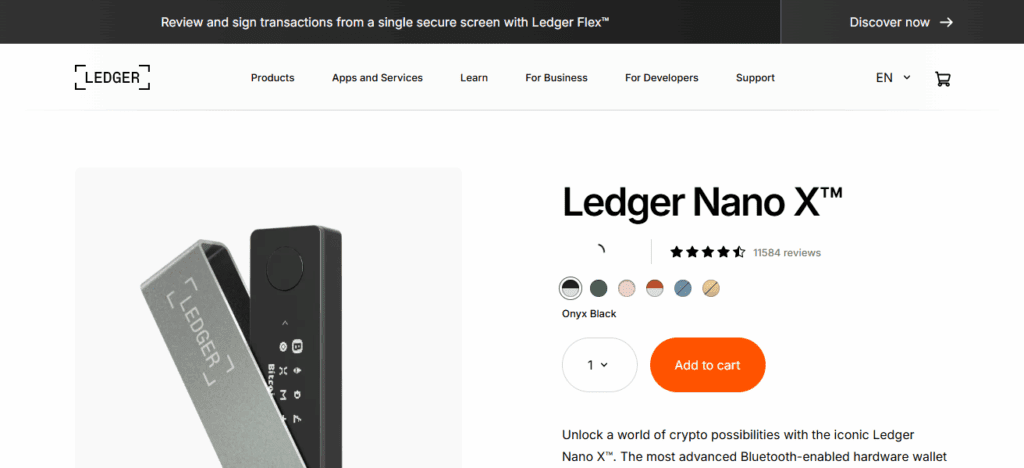
Its clear setup instructions, backup recovery, and security steps such as PIN protection aid absolute beginners. Those willing to spend some money for hassle-free security on their crypto assets in the year 2025, the Nano X is a great option.
Pros And Cons Ledger Nano X
Pros:
- Top and leafer security with the ability to keep crypto offline.
- Strength and support formore than 1,800 cryptocurrencies with tokens.
- Lightning quick convenience with mobile features through Bluetooth.
- Staking and managing digital assets is easy with the Ledger Live application.
Cons:
- Acquiring the hardware wallet is an expense as well as an upfront investment.
- Beginners who have never seen a hardware wallet have a learning period.
- Careful control and consideration must be taken with the recovery phrase.
- Without a mobile device that is able to Bluetooth the device is not very portable.
4. Trezor Model T
Trezor Model T is a great hardware wallet for someone just getting started due the level of security it provides. It keeps the private keys stored in a secure offline environment which protects them from hacking and malware.
It is compatible with a few dozen cryptocurrencies and works well with a number of exchanges and software wallets. Users tend to enjoy the ease of the touchscreen user interface and the guided instructions for completing the wallet’s setup.
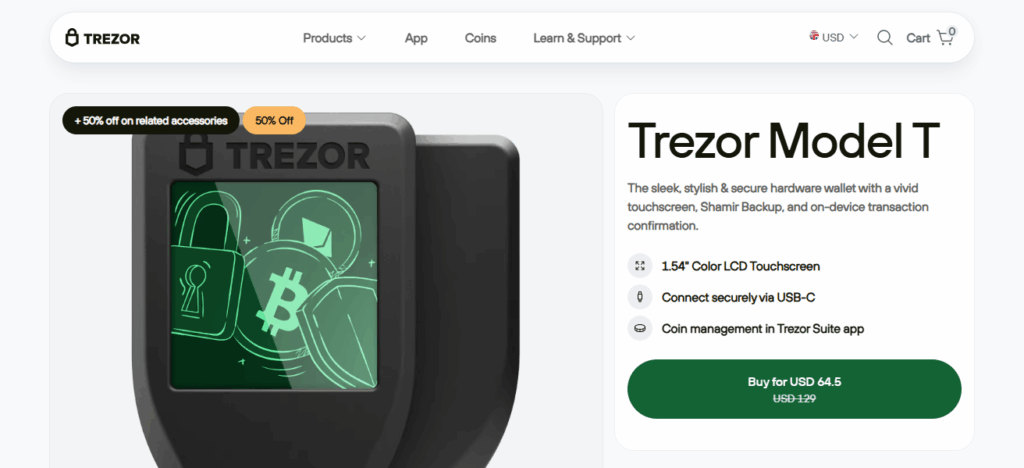
Trezor provides backup protection with a recovery seed as well as passphrase protection and secure PINs in the event the wallet is stolen or lost. It is also compatible with several DeFi apps and includes a versatile password manager.
Pros And Cons Trezor Model T
Pros:
- Full hardware security that keeps private keys offline is a plus.
- The touchscreen simplifies the setup and eases navigation.
- There are hundreds of cryptocurrencies and other services to integrate with.
- The backup recovery feature prevents loss and theft.
Cons:
- There is a high probability that the price will be out of reach for casual novices.
- In comparison to a software wallet it is less portable.
- Certain users may be puzzled by more complex functionality.
- The wallet is a little less handy than mobile wallets since it needs to be connected to the device for the transactions.
5. Coinbase Wallet
Coinbase Wallet is polished user non-custodial wallets that is separate from Coinbase exchange. It supports various cryptocurrencies and allows users to save their private keys on their devices.
Its simple interface and seamless setup gives users ease of access and trading and easy buying and selling of cryptocurrency.
Coinbase Wallet is not only an easy cryptocurrency wallet for beginners but portable and supports more than just simple storage. Coinbase Wallet supports Web3 applications and allows interactions with NFTs.

Users can connect to dApps with ease and monitor their portfolios within Web3 applications. Its outstanding biometric access, backup primes, and strong support ease new users.
They can use their Coinbase account for trading and backup phrases. Beginners and new users protective features in Coinbase Wallet. It is easy and versatile functionality and support as dApps. Ideal for new users in 2025.
Pros And Cons Coinbase Wallet
Pros:
- The wallet has a user friendly interface and is easy for novices.
- There is self custody of the private keys.
- There is integration with other coins and NFTs.
- It is part of the Coinbase ecosystem which allows for easy buying and selling.
Cons:
- The wallet is heavily mobile focused and not very handy for a desktop.
- There are backup procedures that must be observed.
- There are fewer options for advanced trading and DeFi features than other wallets.
- The Coinbase ecosystem offers conveniences but overall flexibility is sacrificed.
6. Exodus Wallet
Used on both desktops and mobile devices, Exodus Wallet is well known for being user-friendly. It is holding over 200 cryptocurrencies which lets users track their assets, track their portfolio, and even change certain coins within the wallet because the wallet itself allows for changes.
Exodus is designed for functionality and beginners which is why there is no complex navigation or unnecessary components and portfolio charts are visual. Also, there are easy backup options which, on their device, backup loaded Exodus private keys.
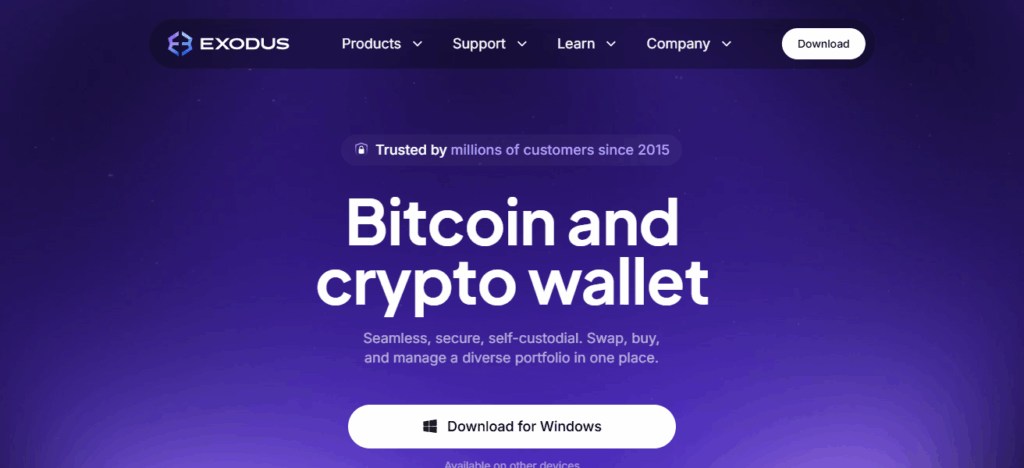
Another example is Exodus integration with Trezor hardware wallets which allows for increased protection. From security and functionality perspectives, Exodus is still focused on software which is why, in 2025, it still is the best versatile wallet with in-app exchanges on the market.
Pros And Cons Exodus Wallet
Pros:
- It is very easy to use on both desktop and mobile devices.2. Over 200 cryptocurrencies supported with in-app exchange.
- For extra safety, users can integrate hardware wallets.
- User-friendly visual interface for portfolio tracking.
Cons:
- The software wallet stores private keys, which are more exposed than hardware, stored on a device.
- Multi-sig and other advanced security protocols lacking.
- Slightly higher exchange in-app fees.
- May be underwhelming for large-scale or professional trading.
7. Atomic Wallet
Atomic Wallet is a non-custodial multi-currency wallet that prides itself on a streamlined and secure user experience. Atomic Wallet Atomic supports 500+ cryptocurrencies, offers atomic swaps functionality, and enables users to self-exchange coins.
Beginners appreciate the clean design, seamless setup, and integrated staking features. Unique in the cryptocurrency space, private keys are fully controlled by wallet users and end-to-end encrypted on their devices.

Wallets have flexible recovery options using seed phrases along with kin seed backups to secure fund recovery. Atomic Wallet’s comprehensive features and versatility make it one of the best crypto wallets for beginners.
Pros And Cons Atomic Wallet
Pros:
- Supports 500+ cryptocurrencies.
- Atomic swaps allow for direct exchanges without intermediaries.
- Staking enabled for passive income.
- Accessible on both mobile and desktop.
Cons:
- Lost device equates to lost wallet.
- Interface and usability may be too complicated for novices.
- Atomic swaps can be slow due to limited liquidity.
- Needs to be stored securely to avoid deletion.
8. Electrum
For people starting out only focused on Bitcoin, Electrum is the ideal starter wallet due to its ease of use. It allows the storage of private keys as Electrum provides sufficient security for the wallet. Users can connect to reliable servers for efficient transactions while controlling the funds.
There are advanced features such as two-factor authentication, multi-signature wallets, and customizable fees, among others. Electrum, while focused on Bitcoin, is still easy enough to be used by novices.
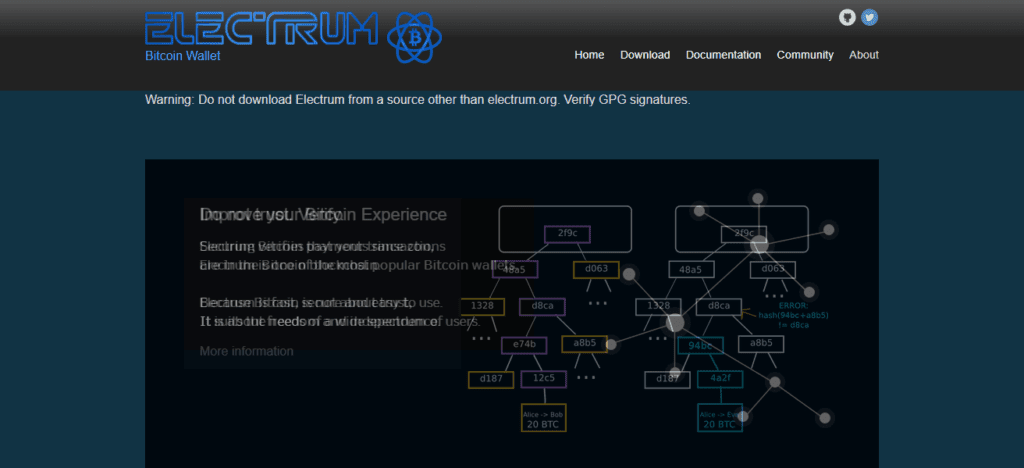
It is also designed with security and speed as core attributes. As such, its recovery features will suit newcomers to Bitcoin in 2025 as there is no complicated procedure to manage the investment.
Pros And Cons Electrum
Pros:
- Fast, light wallet for Bitcoin.
- Offline keys stored, with added security.
- Multi-sig and customizable fees.
- Basic interface for Bitcoin users.
Cons:
- Only Bitcoin, ignoring altcoins.
- To some, the interface may feel too basic.
- Complex features may be daunting for some.
- Mobile inconsistency from the desktop.
9. Binance Wallet
There’s a reason Binance is the biggest crypto exchange in the world: the Binance Wallet that comes with every account will let its owners buy, trade, and sell a huge array of crypto coins and tokens from other networks.
Even web and mobile applications are easy to navigate because of the simple user interfaces. Binance Wallet allows new users to easily stake and send coins with just a few clicks, and also track their portfolio in real time.

All users are able to customize biometric identification, and new users also get 2-factor authentication for their accounts. All of these features, coupled with the invaluable access to the Binance crypto trading platform, makes Binance a great option to use in 2025.
Pros And Cons Binance Wallet
Pros
- Trading on Binance has little friction.
- A large volume of cryptocurrencies can be purchased or staked.
- Flexible web and mobile planetary interfaces.
- Uses biometric and two-step login protections.
Cons
- Integrations with external wallets are weak due to being Binance-centric.
- Trading directly from wallets leaves beginners vulnerable to costly errors.
- A section of users may find the mobile app to be cluttered.
- Binance’s security resources on the wallet have no competition.
10. Guarda Wallet
Grada Wallet is a web, mobile, and desktop wallet that is also non custodial. It is compatible with hundreds of coins including Bitcoin, Ethereum, and a number of altcoins.
Because of the wallet’s user friendly interface and the integrated exchange and staking services which offers the advantages of earning staking rewards from the wallet, it is popular among novices. Users have absolute control of their funds, because private keys are kept on the user’s device.

Supports cross chain transactions and NFT collections. It is still updating on improving usability and security. In the year of 2025, it is still maintaining its beginner friendly status with its Backbone Wallet – user’s secure, straightforward and seamless wallet integration to crypto.
Pros And Cons Guarda Wallet
Pros
- Can be on different systems and still supports hundreds of cryptocurrencies.
- Users are custodial and have sole ownership of the private keys.
- Staking and trading of different cryptocurrencies is done seamlessly on the app.
- Users can perform transactions on different blockchains and have NFTs too.
Cons
- Device-linked software wallets can be hacked and users compromised.
- Some features may be overly complex for new users.
- Losing the wallet and phrase can have damaging consequences.
- Compared to MetaMask and Trust Wallet, this wallet has limited community backing and is less recognized.
Conclusion
To wrap up, selecting the ideal crypto wallet for newcomers is based on the wallet’s security, user-friendliness, and the range of supported cryptocurrencies.
Mobile users would find MetaMask and Trust Wallet ideal, while Ledger Nano X and Trezor Model T provide the best hardware security.
Beginners should focus on wallets that offer an easy-to-use design, robust security, and numerous cryptocurrency options for a positive crypto experience.
FAQ
A crypto wallet is a digital tool that stores your cryptocurrencies and private keys, allowing you to send, receive, and manage your assets securely.
MetaMask, Trust Wallet, and Coinbase Wallet are beginner-friendly due to their simple interfaces, multi-coin support, and secure features.
Hardware wallets store keys offline for maximum security, while software wallets are apps or browser-based and more convenient but slightly less secure.
Yes, if you follow security best practices like backing up your seed phrase, enabling two-factor authentication, and avoiding phishing links.
Yes, wallets like Trust Wallet, Exodus, and Atomic Wallet support multiple coins and blockchains in a single interface.
By using the backup seed phrase provided during wallet setup. This is essential for restoring access to your funds.





